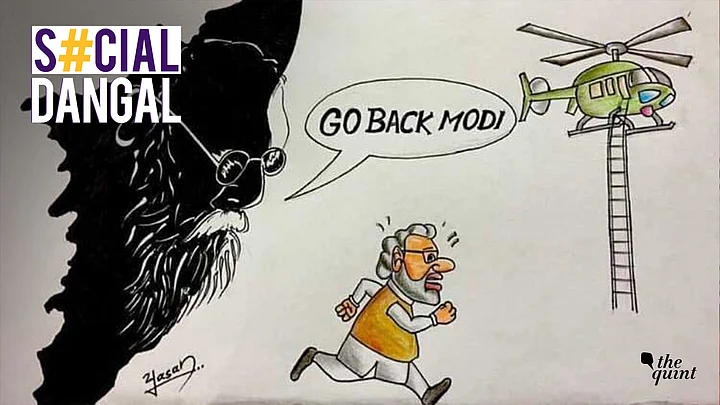The PM’s visit to Madurai has become more about which hashtag was trending more; #GoBackModi or #TNWelcomesModi. Eventually, it was the former that seemed to take over Twitter, much to the embarrassment of the party.
One of the more prominent voices that helped fuel the anti-Modi hashtag on Twitter, was from Meena Kandasamy’s handle.
While it does seem that Tamil Nadu as a whole is anti-Modi, it is important to note that print and TV media are almost entirely DMK bastions, while only a small cross-section of TN’s demographic have taken to Twitter to express their views.
Nevertheless, there are some obvious reasons for the anti-Modi sentiment on ground.
1. Regionality
The state comes first, both for the DMK and the AIADMK, regardless of who they align with for winning elections. The BJP’s TN wing is neither a full-fledged regional party with state-specific agendas, nor is it an adequate representative of the centre yet.
The inception of Tamil Nadu is itself based on the need for a regional division between ‘north’ and ‘south’ India. Beginning with Periyar’s self-respect movement that started off as anti-Brahmin, then gradually turned anti-Hindi, to the Dravidian parties that were born of Annadurai and Karunanidhi’s identity politics; Tamil Nadu stands for both genuine regional pride, and a uninformed hate of anything other. While a large section of the population across the state is politically aware, electoral issues have always remained regional; a solution for the Cauvery water sharing, farm loan waivers, prohibition (or not), reservation and of course, identity.
2. Language
Regardless of whether BJP promotes Hindi (it does), it has rarely done much to promote Tamil. The name ‘Tamil Nadu’ is itself charged with identity politics, on the basis of a language, which has been associated with a ‘different race’.
Anti-Hindi agitations in Tamil Nadu have been a recurring phenomenon. In 1937, the then Chief Minister of Madras State C Rajagopalachari sparked it off, with his decision to make Hindi compulsory.
Again, in 1948, when the Congress urged all states to make Hindi compulsory, the DMK led the agitations and sparked off the gory trend of self-immolation to show protests.
This is why India has no ‘National Language’. This was why Hindi remains an official language.
CN Annadurai re-christened ‘Madras State’ to ‘Tamil Nadu’ on 14 January 1969, barely a fortnight before he passed away, as the first Chief Minister of Tamil Nadu.
Language, in Tamil Nadu is as much a part of its culture, as ‘identity’ is to its politics.
On the one hand, there is growing resonance to the theory that Tamil culture is older than the Sanskrit-based ‘Vedic’ culture of the rest of India. On the other, regional political parties play the ‘Who’s more Tamil?’ game with each other, where the party that wins is the party that is truly Tamil!
Here too, BJP will be hard-pressed to establish an identity that is at once national and regional.
3. No Presence at the Block Level
The party seeks to cash in on the aura of national presence. But in the absence of ground-work at the block level, it is reduced to a toothless franchise. Modi and Amit Shah’s lack of interest or intent in TN so far is prominent.
BJP’s victory in the North East is attributed to its rigorous campaigning and ground work at the block level, and its coordinated political waltz with the local parties. Thus far, BJP has shown no such effort to woo local parties, spend monies on campaigning, or even establish a wider presence.
H Raja, the National Secretary of the BJP and an MLA from the Karaikudi constituency is the only sane voice for the party from Tamil Nadu. But for now, this is too little too late.
4. The 10% Quota
Quota on the basis of economic backwardness has been historically frowned upon in TN. It is what caused MGR’s ONLY political defeat. The number of people in the general quota (read upper class quota) in TN is less than the national average (around 12%).
Historical precedent in Tamil Nadu has been against reservation on the basis of economic backwardness. It is what caused the only political defeat in MGR’s career, and to overcompensate, spiked the quantum of reservation in the state to a whopping 69 percent, the highest in the country, followed by Rajasthan’s 54 percent, a distant second.
The recent 10 percent reservation on the basis of economic backwardness is being perceived as the return of upper-caste (specifically Brahmin) hegemony in government jobs and educational institutions. DMK has historically opposed economic status as a criteria for reservation. As the chief opposition party in TN, it has already begun campaigning against the move.
What of the real issues, you ask? Honestly, they don’t matter. Whether it be the Centre’s apathy during the Gaja cyclone, or the delay in setting up of a Cauvery management board, the DMK and AIADMK are equally guilty. The real problem is identity, regionality and religion.
